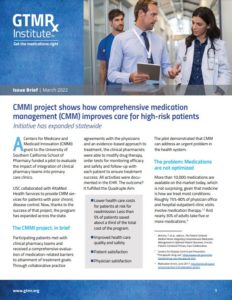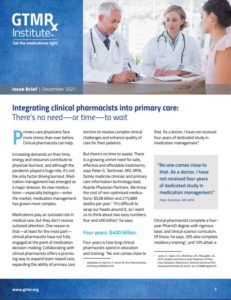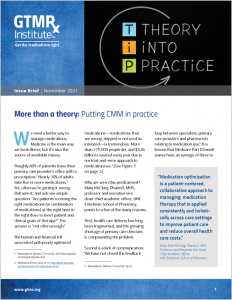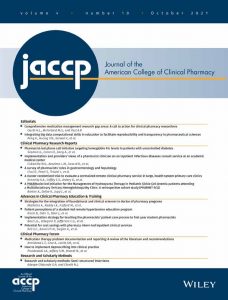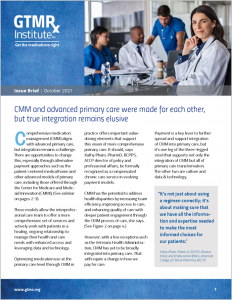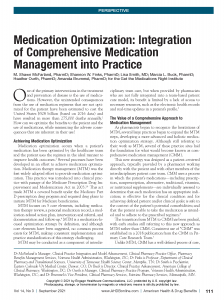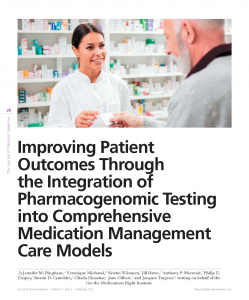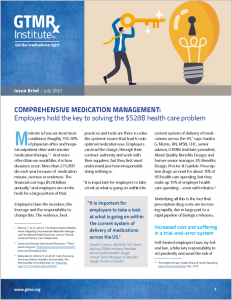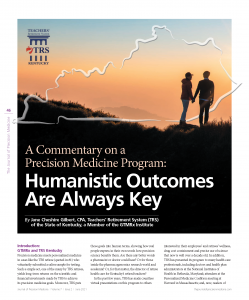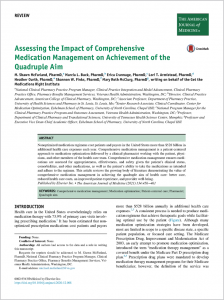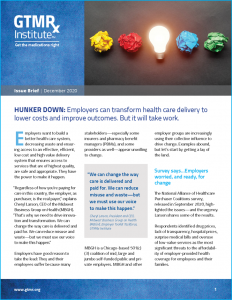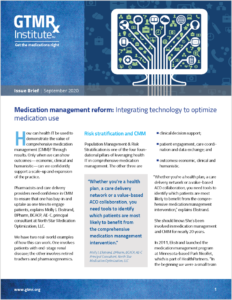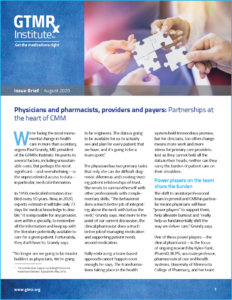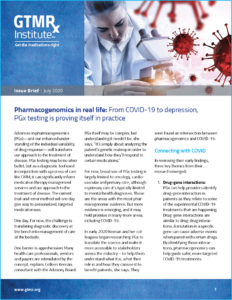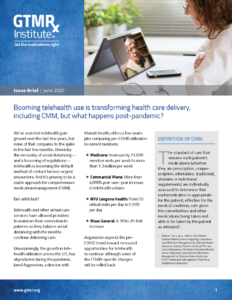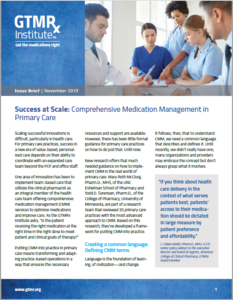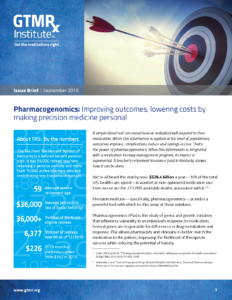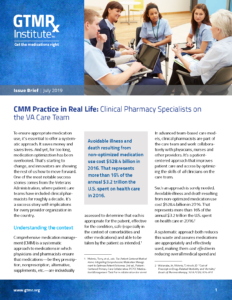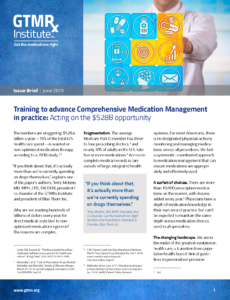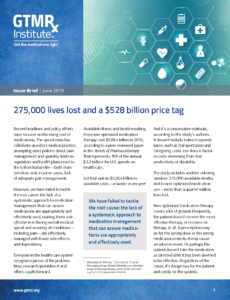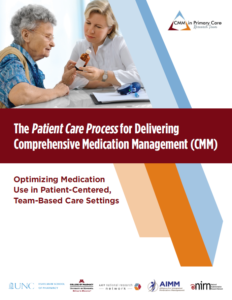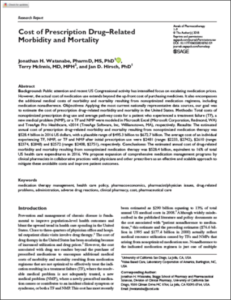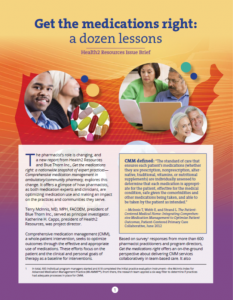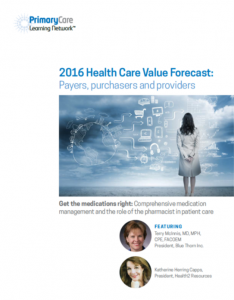White papers and issue briefs speak to national issues and their impact. We feature expert thought leaders who speak to the latest best practices and trends.
Feel free to read, download and share.
March 2022 | Issue Brief
CMMI project shows how comprehensive medication management (CMM) improves care for high-risk patients:
Initiative has expanded statewide
A Centers for Medicare and Medicaid Innovation (CMMI) grant to the University of Southern California School of Pharmacy funded a pilot to evaluate the impact of integration of clinical pharmacy teams into primary care clinics. USC collaborated with AltaMed Health Services to provide CMM services for patients with poor chronic disease control. Now, thanks to the success of that project, the program has expanded across the state.
What happened with USC and AltaMed can happen around the country. GTMRx believes CMMI should play a central role in developing payment models that support—and sustain—team-based care and services that optimize medication use through advanced primary care and specialty models. GTMRx’s supports CMMI’s new strategic focus and is available to offer expertise and support to advance the organizations goals. Now is the time to invest in teambased, patient-centered care models that recognize appropriately skilled
clinical pharmacists as medication experts who work in collaborative practice with physicians and other providers.
Featuring the voices of:
- Steven Chen, PharmD, MHS, GTMRx distinguished fellow, associate dean for clinical affairs at USC School of Pharmacy;
- Michael Hochman, MD, MPH, CEO of Healthcare in Action, SCAN Group.
December 2021 | Issue Brief
Integrating clinical pharmacists into primary care: There’s no need—or time—to wait
Primary care physicians face more stress than ever before. Clinical pharmacists can help. Increasing demands on their time, energy and resources contribute to physician burnout, and although the pandemic played a huge role, it’s not the only factor driving burnout. Medication management has emerged as a major stressor. As new medications—especially biologics—enter the market, medication management has grown more complex. Medications play an outsized role in medical care, but they don’t receive outsized attention. One reason is that—at least for the most part— clinical pharmacists have not fully engaged at the point of medication decision-making. Collaborating with clinical pharmacists offers a promising way to expand team-based care, expanding the ability of primary care doctors to resolve complex clinical challenges and enhance quality of care for their patients.
Featuring the voices of:
- Shaowei Wan, PhD, MS, MA, BPharm; Research Fellow in Palliative Care and Aging, University of Colorado School of Medicine
- Peter Teichman, MD, MPA, Family Medicine, Asante Physician Partners
- Holly Christian, PharmD; Clinical Pharmacy Specialist in Family Medicine, Asante Physician Partners
November 2021 | Issue Brief
More than a theory: Putting CMM in practice
We need a better way to manage medications. Medicine is the main way we treat illness, but it’s also the source of avoidable misery.
Roughly 80% of patients leave their primary care provider’s office with a prescription. Nearly 30% of adults take five or more medications. Yet, often we’re getting it wrong. Reframe it, and ask one simple question: “Are patients receiving the right medications (or combination of medications) at the right time in the right dose to meet patient and clinical goals of therapy?” The answer is “not often enough.”
Featuring the voices of:
- Annie Ideker, MD, Senior Medical Advisor—Clinician Experience, Senior Medical Advisor—Clinician/Patient, Relationships (Ambulatory), HealthPartners
- Mary Roth McClurg, Pharm.D., MHS, Professor and Executive Vice Dean-Chief, Academic Officer, UNC Eshelman School of Pharmacy
October 2021 | Published Literature (Journal of American College of Clinical Pharmacy | Volume 4, Issue10 | October 2021 | Pages 1260-1262)
Comprehensive medication management research gap areas: Acall to action for clinical pharmacy researchers
The article, written by GTMRx workgroup members from the Evidence-Based Resources Subgroup of the Practice and Care Delivery Transformation Workgroup, was published in the Journal of the American College of Clinical Pharmacy. It discusses existing gap areas and recommendations based off a review of current CMM-literature on implementation and impact. Authors include Heather L. Ourth, Pharm.D., BCPS, BCGP; Shawn McFarland Pharm.D., FCCP, BCACP; and Ashley P. Yost Pharm.D., BCPS, BCCCP—all from the VA.
NOTE: Access to the full version of this article requires a JACCP login or payment.
October 2021 | Issue Brief
CMM and advanced primary care were made for each other, but true integration remains elusive
“Health care is now a team-based sport, and I think we truly understand the importance of engaging patients and families in their care.”—Ann Greiner, President and CEO, Primary Care Collaborative (PCC)
Comprehensive medication management (CMM) aligns with advanced primary care, but integration remains a challenge. There are opportunities to change this, especially through alternative payment approaches such as the patient-centered medical home and other advanced models of primary care, including those offered through the Center for Medicare and Medicaid Innovation (CMMI).
These models allow the interprofessional care team to actively work with patients in a healing, ongoing relationship to manage their health and care needs with enhanced access and leveraging data and technology.
Featuring the voices of:
- Kathy Pham, Pharm.D., BCPPS, Director, Policy and Professional Affairs, American College of Clinical Pharmacy (ACCP)
- Ann Greiner, President, Chief Executive Office, Primary Care Collaborative (PCC)
September 2021 | Published White Paper (American Health & Drug Benefits | Vol 14, No 3 | September 2021)
Medication Optimization: Integration of Comprehensive Medication Management into Practice
One of the primary interventions in the treatment and prevention of disease is the use of medications. However, the unintended consequences from the use of medication regimens that are not optimized for the patient have been estimated to cost the United States $528 billion (based on 2016 data) and have resulted in more than 275,000 deaths annually.1 How can we optimize the benefits to the patient and the use of medications, while minimizing the adverse consequences that are inherent in their use?
1. Watanabe JH, McInnis T, Hirsch JD. Cost of prescription drug–related morbidity and mortality. Ann Pharmacother. 2018;52:829-837
September 2021 | Published White Paper (Journal of Precision Medicine | Volume 7 | Issue 3 | September 2021)
Improving Patient Outcomes Through the Integration of Pharmacogenomic Testing into Comprehensive Medication Management Care Models
Abstract
July 2021 | Issue Brief
Comprehensive Medication Management: Employers hold the key to solving the $528B health care problem
Medicine is how we treat most conditions: Roughly 75%-80% of physician office and hospital outpatient clinic visits involve medication therapy.1,2 And more often than we would like, it is how disasters occur. More than 275,000 die each year because of medication misuse, overuse or underuse. The financial cost tops $528 billion annually,3 and employers are on the hook for a large portion of that. Employers have the incentive, the leverage and the responsibility to change this. The evidence, best practices and tools are there to solve the systemic issues that lead to suboptimal medication use. Employers can lead the charge, through their contract authority and work with their suppliers, but they first must understand just how irresponsible doing nothing is.
Featuring the voices of
- Sandra G. Morris, RN, MSN, CHC, Senior Advisor, GTMRx Institute; President, About Quality Benefits Design; Former Senior Manager, US Benefits Design, Procter & Gamble and
- Jan D. Hirsch, BS Pharm, PhD, Founding Dean and Professor of Clinical Pharmacy School of Pharmacy and Pharmaceutical Sciences, University of California, Irvine
- McInnis, T. et al., editors. The Patient-Centered Medical Home: Integrating Comprehensive Medication Management to Optimize Patient Outcomes. 2nd ed., Patient- Centered Primary Care Collaborative.
- Centers for Disease Control and Prevention. “Therapeutic drug use.” https://www.cdc.gov/nchs/fastats/drug-use-therapeutic.htm
- Watanabe JH, McInnis T, Hirsch JD. Cost of prescription drug-related morbidity and mortality. Ann Pharmacother 2018;52(9):829-37. https://doi.org/10.1177/1060028018765159
January 2021 | Peer-reviewed Article (The American Journal of Medicine)
Assessing the Impact of Comprehensive Medication Management on Achievement of the Quadruple Aim
Abstract
December 2020 | Issue Brief
Hunker Down: Employers can transform health care delivery to lower costs and improve outcomes. But it will take work.
Employers want to build a better health care system, decreasing waste and ensuring access to an effective, efficient, low cost and high value delivery system that ensures access to services that are of highest quality, are safe and are appropriate. They have the power to make it happen.
This issue brief highlights:
- strategies to battle waste while improving care,
- employers who are focusing on medication,
- moving beyond medication therapy management to comprehensive medication management,
- which patients benefit the most from CMM; and
- rethinking drug benefit design.
Featuring the voice of Cheryl Larson, President and CEO, Midwest Business Group on Health and Employer Toolkit Taskforce, GTMRx Institute
September 2020 | Issue Brief
Medication Management Reform: Integrating technology to optimize medication use
Featuring the voices of
- Molly Ekstrand, BPharm, BCACP, AE-C, Consultant with North Star Medication Optimization, LLC, GTMRx Institute
- Jane Gilbert, CPA, Director of Retiree Health Care, Teachers Retirement System of the State of Kentucky
August 2020 | Issue Brief
Physicians and pharmacists, providers and payers: Partnerships at the heart of CMM
Experts estimate it will take only 73 days for medical knowledge to double.1 It is impossible for any provider, even within a specialty, to remember all the information and keep up with the literature potentially available to care for a given patient. By shifting to an interprofessional team in general and CMM in particular means physicians will have “power players” to support them, help alleviate burnout and help fundamentally shift the way care is delivered.
Featuring the voices of
- Paul Grundy, MD, MPH, FACOEM, FACPM, Chief Transformation Officer, lnnovaccer; President, GTMRx Institute
- Kylee Funk, PharmD, Associate Professor, University of Minnesota College of Pharmacy
- Todd Sorensen, PharmD, Professor and Associate Dean; Executive Director, College of Pharmacy, University of Minnesota; Alliance for Integrated Medication Management
- “Clinical Decision Support as ‘A Bright Future for Healthcare Delivery:’ Episode 66, May 2019.
July 2020 | Issue Brief
Pharmacogenomics in real life: From COVID-19 to depression, PGx testing is proving itself in practice
Advances in pharmacogenomics (PGx)—and our enhanced understanding of the individual variability of drug response—will transform our approach to the treatment of disease. PGx testing may be no silver bullet, but as a diagnostic tool used in conjunction with a process of care like CMM, it can significantly inform medication therapy management services and our approach to the treatment of disease. The current trial-and-error method will one day give way to personalized, targeted medication use.
One day. For now, the challenge is translating diagnostic discovery at the bench into management of care at the bedside.
Featuring the voices of Emily J. Cicali, Pharm.D., BCPS, Clinical Assistant Professor, University of Florida, College of Pharmacy and Colleen Keenan, Consultant, Advisory Board.
June 2020 | Issue Brief
Booming telehealth use is transforming health care delivery, including CMM, but what happens post-pandemic?
November 2019 | Issue Brief
Success at Scale: Comprehensive Medication Management in Primary Care
Comprehensive medication management (CMM) is a systematic approach to ensuring all medications are safe, effective and appropriate for the patient. But operationalizing CMM into team-based primary care delivery takes a systematic approach, too. This webinar offers a customizable blueprint for delivery of CMM and demonstrates how it improves work-life balance for primary care providers. It includes strategies learned from practices in the field and showcases research-based tools practices can use to implement CMM.
Featuring the voices of Mary Roth McClurg, Pharm.D., MHS, professor and executive vice dean-chief academic officer at the UNC Eshelman School of Pharmacy and Ed Webb, Pharm.D., MPH, FCCP, GTMRx Institute board member and senior policy advisor to the executive director and Board of Regents of the American College of Clinical Pharmacy.
*For those looking for the November resources referenced in the webinar, the anticipated release date is now early 2020. Once available, we will put a notification here.
September 2019 | Issue Brief
Pharmacogenomics: Improving outcomes, lowering costs by making precision medicine personal
Pharmacogenomics considers the role of the genome in drug response. It combines pharmacology and genomics, considering how the genetic makeup of an individual affects his/her response to drugs.
Today, more than ever before, we have the ability to target the right drug to improve a patient’s quality of life while also eliminating waste from non-optimized medications. This issue brief provides an overview of pharmacogenomics and showcases an employer case example of the opportunities and savings available to employers and health plans through integration of personalized medicine into benefit plan design.
Featuring the voices of Jane Cheshire Gilbert, CPA, director of retiree health care for the Teachers’ Retirement System of the State of Kentucky and Steve Goldberg, MD, vice president, medical affairs, population health and chief health officer, health & wellness, Quest Diagnostics, GTMRx Institute board member.
July 2019 | Issue Brief
CMM Practice in Real Life: Clinical Pharmacy Specialists on the VA Care Team
June 2019 | Issue Brief
Training to advance Comprehensive Medication Management in practice: Acting on the $528B opportunity
What will it take to expand the use of comprehensive medication management? Greater awareness among payers, providers and patients is required, of course. More specifically, it will require education and training. Perhaps the most important aspect is integration of CMM—and the clinical pharmacist—into the care team. That takes savvy in team-based care integration, creating collaborative practice agreements and more. This issue brief explores the need for CMM and implications for pharmacy education and training, as well as how CMM is integrated into team-based care models.
Featuring the voices of Terry McInnis, MD, MPH, president and co-founder, Get the Medications Right Institute and Foundation; president, founder, Blue Thorn Inc.; and Jan Hirsch, BS Pharm, Ph.D., director and founding dean, Pharmaceutical Sciences University of California, Irvine.
June 2019 | Issue Brief
275,000 lives lost and a $528 billion price tag
Avoidable illness and death resulting from non-optimized medication therapy cost $528.4 billion in 2016, according to a peer-reviewed paper in the Annals of Pharmacotherapy. That represents 16% of the annual $3.2 trillion the U.S. spends on health care. This issue brief from Health2 Resources explores the research behind the figures and discusses the promise of comprehensive medication management as a systematic approach that can assure medications are appropriately and effectively used–making them both cost effective and assuring that all conditions are effectively managed with fewer side effects.
Featuring the voices of Terry McInnis, MD, MPH, president and co-founder, Get the Medications Right Institute and Foundation; president, founder, Blue Thorn Inc.; and Jonathan H. Watanabe, Pharm.D., M.S., Ph.D. BCGP, associate professor of clinical pharmacy, Skaggs School of Pharmacy and Pharmaceutical Sciences, University of California, San Diego.
July 2018 | White Paper
The Patient Care Process for Delivering Comprehensive Medication Management (CMM)
Defining an intervention and ensuring consistency in delivery is necessary to establish a common understanding and set of expectations across key stakeholder groups including patients, pharmacists, physicians, other health care providers, and payers. This also allows the service to be recognized as distinct, yet complementary to care provided by the primary or specialty care provider. An intervention, such as comprehensive medication management (CMM), focused on optimizing medication use must be defined with a degree of specificity that allows consistent training of clinical pharmacists and other health care providers, replication of the service, and observable fidelity of the service across practitioners.
This white paper provides a framework and common language for understanding CMM and delivering it through a detailed patient care process. It was funded by the American College of Clinical Pharmacy, the American College of Clinical Pharmacy Research Institute and the UNC Eshelman Institute for Innovation. Content was developed by researchers at the UNC Eschelman School of Pharmacy, University of Minnesota College of Pharmacy and the University of Colorado.
March 2018 | Academic Research Article
Cost of Prescription Drug-Related Morbidity and Mortality
May 2016 | Issue Brief
Get the medications right™: a dozen lessons
An issue brief from Health2 Resources, Get the medications right™: a dozen lessons, explores how comprehensive medication management is transforming care delivery for patients, pharmacists and other clinicians.
It identifies key lessons from the new report, Get the medications right™: a nationwide snapshot of expert practices–Comprehensive medication management in ambulatory/community pharmacy. The report, from Health2 Resources and Blue Thorn Inc. and sponsored by the Community Pharmacy Foundation, offers insight into how pharmacists, as both medication experts and clinicians, are optimizing medication use and making an impact on the practices and communities they serve.
- HealthPartners began paying for CMM-level services in 2006. Nearly everyone with a HealthPartners pharmacy benefit is eligible for CMM; that’s about 850,000 people. HealthPartners also employs pharmacists at 15 of its own clinics. Dan Rehrauer, PharmD, is the senior manager of the medication therapy management program.
- Goodrich Pharmacy has 18 pharmacists at seven sites; five sites provide CMM. In 2015, they saw roughly 900 CMM patients and 700 disease-state medication management patients. Goodrich also contracts with six primary care clinics, providing CMM patient consultations for a flat fee. Steve Simenson, BPharm, FAPhA, DPNAP, is president and managing partner.
June 2016 | Primary Care Learning Network White Paper
Get the medications right™: Comprehensive medication management and the role of the pharmacist in patient care.
It’s long past the time to talk about “pilots” or “emerging practices” when discussing comprehensive medication management (CMM). CMM programs have been tested and retested, the results studied and documented. It’s not emerging: It has emerged—as a practice to improve outcomes, control costs and enhance the satisfaction of clinicians and patients alike. Health systems, patients, physicians—even payers—are beginning to understand the value of advanced clinical pharmacy services and the importance of integrating those services collaboratively into community/ambulatory team-based care, explains Terry McInnis, MD, MPH, CPE, FACOEM, in this white paper.
Do you agree? Join us. Together we can transform practice, use evidence wisely and implement real policy solutions.

